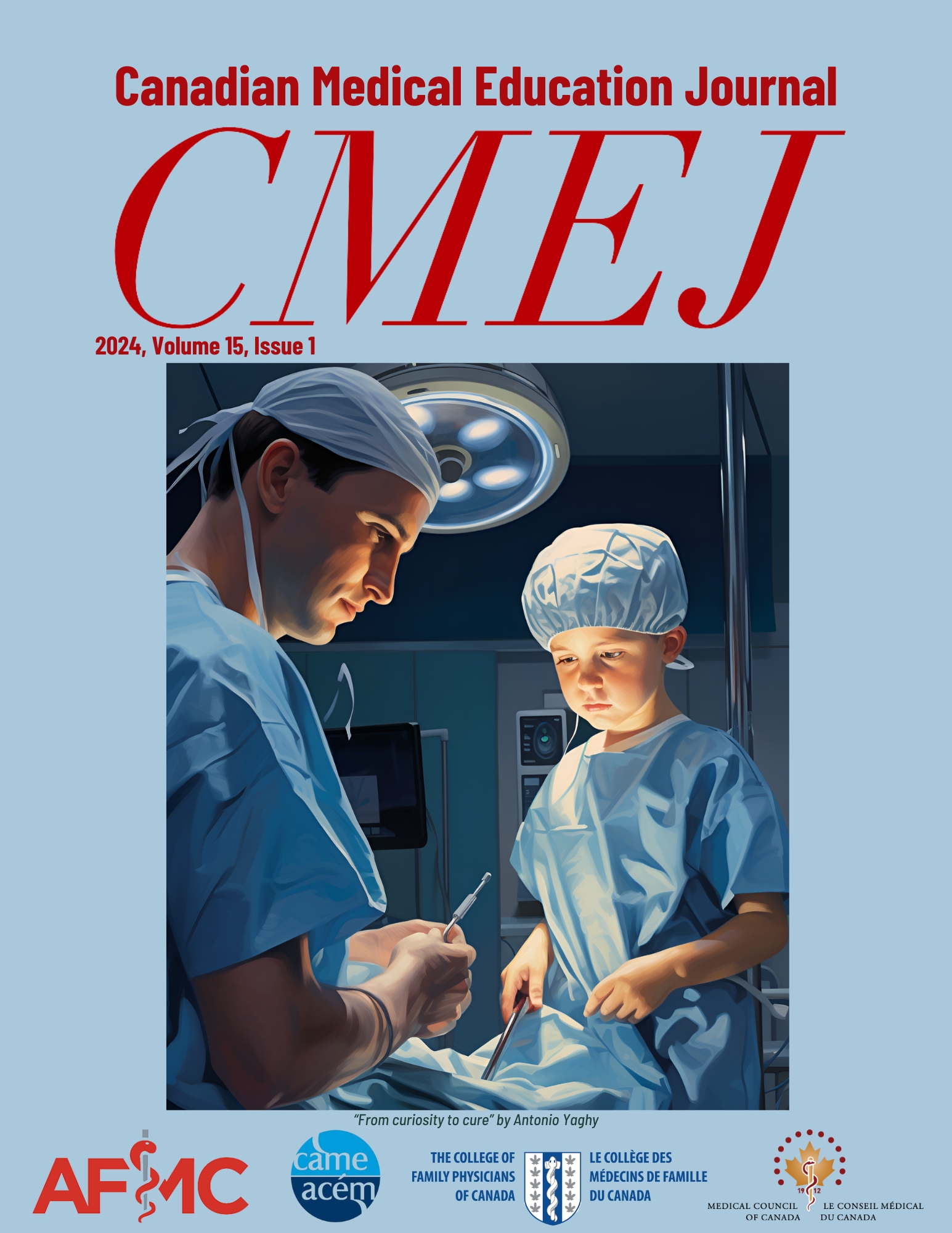Five ways to get a grip on teaching advocacy in medical education: the health humanities as a novel approach
DOI:
https://doi.org/10.36834/cmej.75274Abstract
The advocate role is recognized as an intrinsic medical competency. Despite recent attention to pedagogical approaches, it is a role that remains poorly understood and difficult to teach. At the same time there is a growing body of evidence showing the necessity of incorporating humanities-based education into medical curricula. Here, we present five ways to use the humanities as a tool for teaching the advocate role including: decentring the physician as expert, fostering provider engagement, allowing for flexibility, making the humanities mandatory and normalizing narrative tools in education and practice.
References
Flynn L, Verma S. Fundamental components of a curriculum for residents in health advocacy. Med Teach. 2008;30(7):178-183. https://doi.org/10.1080/01421590802139757 DOI: https://doi.org/10.1080/01421590802139757
Poulton A, Rose H. The importance of health advocacy in Canadian postgraduate medical education: current attitudes and issues. Can Med Educ J. 2015;6(2):e54-e60. https://doi.org/10.36834/cmej.36665 DOI: https://doi.org/10.36834/cmej.36665
Verma S, Flynn L, Seguin R. Faculty's and residents' perceptions of teaching and evaluating the role of health advocate: a study at one Canadian university. Acad Med. 2005;80(1):103-108. https://doi.org/10.1097/00001888-200501000-00024 DOI: https://doi.org/10.1097/00001888-200501000-00024
Hubinette M, Dobson S, Scott I, Sherbino J. Health advocacy. Med Teach. 2017 Feb;39(2):128-135. https://doi.org/10.1080/0142159X.2017.1245853. DOI: https://doi.org/10.1080/0142159X.2017.1245853
Carr S, Noya F, Phillips B. et al. Health Humanities curriculum and evaluation in health professions education: a scoping review. BMC Med Educ 2021;21(568) https://doi.org/10.1186/s12909-021-03002-1 DOI: https://doi.org/10.1186/s12909-021-03002-1
Shalev D, McCann R. Can the medical humanities make trainees more compassionate? A neurobehavioral perspective. Acad Psychiatry. 2020;44:606–610. https://doi.org/10.1007/s40596-020-01180-6 DOI: https://doi.org/10.1007/s40596-020-01180-6
Miller S. A curriculum focused on informed empathy improves attitudes toward persons with disabilities. Perspect Med Educ. 2013;2:114-125. https://doi.org10.1007/s40037-013-0046-3 DOI: https://doi.org/10.1007/S40037-013-0046-3
Farrel C, Towell A, Godolphin W. Where’s the patient’s voice in health professional education? A Report from the 1st International Congress on Health Care Communication, University of British Columbia. 2006. Available at https://health.ubc.ca/sites/health.ubc.ca/files/documents/PtsVoiceReportbook.pdf [Accessed on Dec 11, 2022].
Gruen R, Pearson S, Brennan T. Physician-Citizens—Public Roles and Professional Obligations. JAMA. 2004;291(1):94–98. https://doi.org/:10.1001/jama.291.1.94 DOI: https://doi.org/10.1001/jama.291.1.94
Stafford S, Sedlak T, Fok M, Wong C. Evaluation of resident attitudes and self-reported competencies in health advocacy. BMC Med Educ. 2010;10(82). https://doi.org/10.1186/1472-6920-10-82 DOI: https://doi.org/10.1186/1472-6920-10-82
Downloads
Published
Issue
Section
License
Copyright (c) 2023 Arundhati Dhara, Sarah Fraser

This work is licensed under a Creative Commons Attribution-NonCommercial-NoDerivatives 4.0 International License.
Submission of an original manuscript to the Canadian Medical Education Journal will be taken to mean that it represents original work not previously published, that it is not being considered elsewhere for publication. If accepted for publication, it will be published online and it will not be published elsewhere in the same form, for commercial purposes, in any language, without the consent of the publisher.
Authors who publish in the Canadian Medical Education Journal agree to release their articles under the Creative Commons Attribution-Noncommercial-No Derivative Works 4.0 Canada Licence. This licence allows anyone to copy and distribute the article for non-commercial purposes provided that appropriate attribution is given. For details of the rights an author grants users of their work, please see the licence summary and the full licence.











